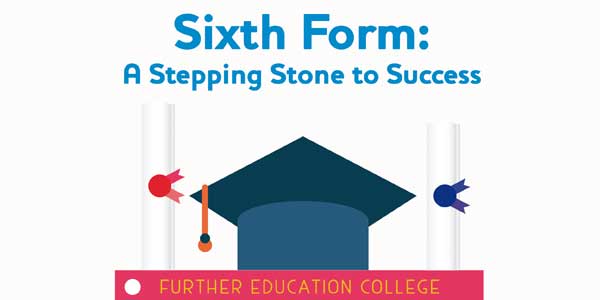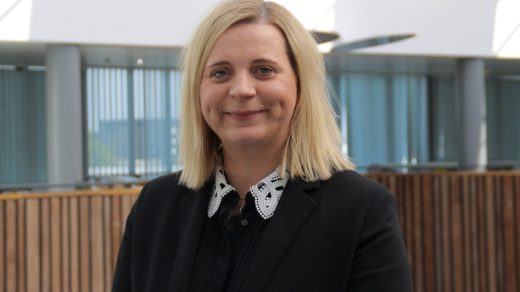Sixth Form: A Stepping Stone to Success

Throughout a student’s academic career, there are a number of key transitions; jumping from primary to secondary school is often considered the most significant change with the move to university following close behind. Whilst the two intermittent college years may seem like a mere stepping stone to higher education, making the right decision about where to go and what to study at sixth form is crucial for a student’s future.
Across the Liverpool City Region, students are spoilt for choice when it comes to choosing where to study; whether they stay at school, move to a sixth form college, a further education college (FE college) or even specialist college. But whilst there are more post 16 options available than ever for young people, it’s important that every student takes time out of their busy GCSE year to do some research and ensure they make the best choice for their future.
Although it seems that students are opting to move around more in recent years, staying on at school is still the most popular option for young people, and there are many reasons why. Having studied for five years at the same school, students will be familiar with all aspects of their learning environment and are perfectly placed to make the most of established relationships with teachers and their peers. Although it may seem obvious, the benefit of this familiarity should not be underestimated; a closer working relationship between students and teachers can ensure an almost seamless transition between GCSE and advanced level education, and help students progress more quickly with their studies. It also relieves the pressure of getting used to a new environment and making new friends. This is particularly valuable for students who require extra support and structure in their education such as young people with special educational needs or a disability.
Due to changes introduced in September 2015, A-levels are now fully linear meaning that students take all their examinations at the end of the two year course, rather than in modular form. Having less opportunity to re-sit failed examinations may encourage students to stay on at school and stick with what they know rather than risk moving to another institution.
However, one thing for students to consider is that schools generally offer less choice in terms of subjects and tend to focus on traditional academic subjects. This may inhibit students who need to study a specific subject to access their chosen career path, or young people who want to study a more vocational course.
Calderstones School, winner of Educate Awards 2015 Career Aspiration award, offers mainly A-levels in the sixth form, but also offers some BTEC and OCR qualifications. Careers, information, advice and guidance are regarded as an integral part of the holistic development of students at Calderstones School and teachers at the school strive to inform students of the opportunities that are available, such as links with local and national businesses to enhance students’ work experience as well as partnerships with universities. Enrichment opportunities, such as the Duke of Edinburgh, are offered at Calderstones as well as numerous leadership opportunities. Such roles may not be as readily available in a college where there are no younger students to mentor.
Other young people like the idea of staying in a school environment but are simply looking for a change and there is a growing trend across the Liverpool City Region of students moving to other schools to study for their A-levels. As a result, many school sixth forms compete to not only retain their best students but also attract external applicants. Unlike in secondary school, rules on catchment areas do not apply in the same way and entry grades tend to be relaxed, with most schools requiring 5 A*- C grades at GCSE to progress into the sixth form. Perhaps some students have friends at other schools or they could be looking to make the move from a single sex school to co-educational, or vice versa – there are a multitude of reasons.
However, starting at a school where friendship groups are already formed can be isolating for some young people, and pre-existing cliques can make it harder to fit in. Entering into an established environment as a newcomer is not easy, and the added pressure of an increased work load at an advanced level can make the transition even more challenging. In some cases, this has led to students returning to their original schools in the first term of Year 12.
Students looking to leave school may prefer to go to a standalone sixth form college where, although students may come in friendship groups, it is a new environment and everybody is in the same boat. Attending a separate sixth form college can be a fantastic option for students who may not have had a positive experience of secondary school and are looking for a new start. Sixth form colleges can be seen as a stepping stone between school and universities and are also a halfway house between the contained structure offered at Years 12 and 13 at school and the laissez faire approach fostered at FE colleges.
Sixth form colleges have proven to be very successful in preparing students for higher education and the world of work. Indeed, there is research to show that students at sixth form colleges are more likely to achieve top grades at A-level than those who stay on at school. This may be due in part to the fact that sixth form colleges employ teachers that specialise in A-level provision and have more experience working with students in the 16-18 age bracket.
Carmel College in St Helens has been recognised as the top sixth form college in the country for A-level progress and is a popular choice for students in the area. Having invested £23 million in technology-rich facilities, Carmel College offers an outstanding learning environment which many schools cannot match.
Rob Peacock, principal at Carmel College, believes that sixth form colleges provide the best opportunities for those who opt for a broad based education at 16. “The fact that our teachers specialise in A-level and other post 16 qualifications makes them real experts in their subjects,” says Rob. “Giving our students this choice ensures that education at Carmel is genuinely personalised. We offer a half-way house between school and university or apprenticeships where students develop as independent learners but are none the less supported by post 16 specialists.”
Another institution flying the flag for sixth form colleges is Birkenhead Sixth Form, which prides itself on the experience it offers students in Wirral. Exemplifying how sixth form colleges get the balance right between offering independent learning and keeping hold of school traditions, Birkenhead Sixth Form has an elected Head Boy or Head Girl, offers a number of subject trips and expeditions and holds Christmas and summer college productions. It also offers students support in a number of ways which are akin to at school, such as assigning each student a personal tutor as well as offering other forms of pastoral care. Recently, the sixth form has announced a number of subsidised college bus services for students from as far as Neston so that travel no longer has to be a barrier to students wanting to access specialist sixth form education.
For some young people, the prospect of attending a FE college is especially exciting. FE colleges are more like universities in their delivery of education, and the informal environment offered can be appealing to students who want to feel grown up and in charge of their own education. Even the prospect of no dress code can be a draw for students who may feel that their identity was stifled by strict school uniforms. Factors such as sharing classes with mature students, and addressing teachers by their first names, also help to set FE colleges apart from schools which can be excellent preparation for higher education. However, students who are less confident and less mature or are simply not ready to manage their own learning, may struggle.
The City of Liverpool College is housed in a £100 million campus in the heart of the city centre, making it easily accessible from all areas across the region. The college models itself on a university system and alongside its extensive course offering, has an active student union and enrichment team which encourages students to make the most of their free time.
There are a huge number of flexible course options available at The City of Liverpool College, including a wide variety of vocational courses which students are simply unable to access at a school or sixth form college. FE colleges, such as The City of Liverpool College, are also useful for young people who are less successful at GCSE but want to continue their education by offering qualifications starting at varying levels. In addition, apprenticeships and other work based learning options can be more readily accessed through FE colleges, and timetables can be flexible to include evening courses.
During their education, students are often given mixed messages about whether to specialise in a chosen field or keep their options open by choosing facilitating subjects. Whilst 16 may seem like a young age to specialise, and most students wait until degree level, many young people know exactly which direction they would like to follow after their GCSEs. For these students, specialist colleges can be the preferred path.
In September 2016, LIPA Sixth Form will open its doors to selected students wishing to pursue a career in the creative and performing arts. LIPA Sixth Form College, which will be situated in Liverpool city centre, will enable students to specialise in: Acting, Dance, Technical Theatre, Performance Design, Music Performance or Technology, studying at BTEC Level 3 Extended Diploma (each equivalent to three A-levels). These courses are offered as part of a programme of study which includes the further development of English and maths skills for all students, as well as the development of employment skills.
“LIPA Sixth Form College is unique as we are the only specialist performing arts sixth form college in the North West of England. This entails us being based in an outstanding specialist facility (designed and built to our specifications) and taught by a team of highly experienced practitioners in their given specialisms,” says Charles Bartholomew, director of LIPA Sixth Form. “In addition, we will also benefit from the input of The Liverpool Institute for Performing Arts (LIPA), which is a world-renowned centre for performing arts learning. All students take part in a well-considered but challenging selection process, which enables them to decide whether a life in the performing and creative arts is for them, as personal commitment is key to their success.
Other popular specialist colleges in the region include Myerscough College’s Liverpool centre at Croxteth Park, which specialises in Horticulture and land based education and training, and the sixth form at Liverpool Life Sciences UTC for students wishing to secure a career in Science or Healthcare.
With stiff competition between schools, sixth form colleges and FE colleges, every institution will try to convince students that their college is the best. However, deciding which path to take into higher education is an incredibly personal choice and largely depends on a student’s desired career path but also on their character and work ethic. For some young people, the freedom and opportunity for independent learning offered at an FE college is enough to inspire them. Others will be perfectly happy to stay in the safe and familiar arms of their school and, for those who are looking for something in between, sixth form colleges offer a balanced gateway into higher education. Ultimately, it’s not about finding the best college; it’s about finding the right one.




